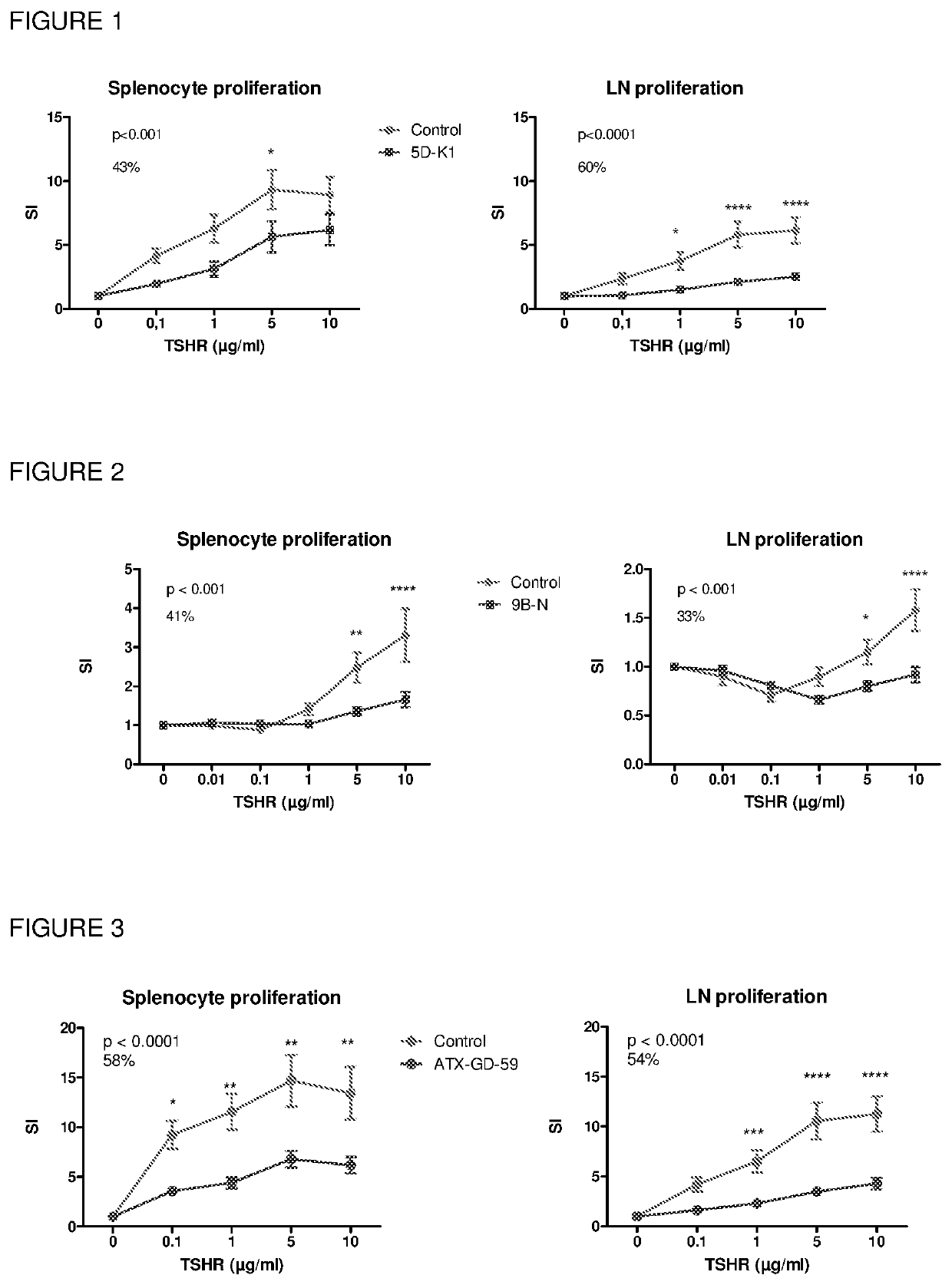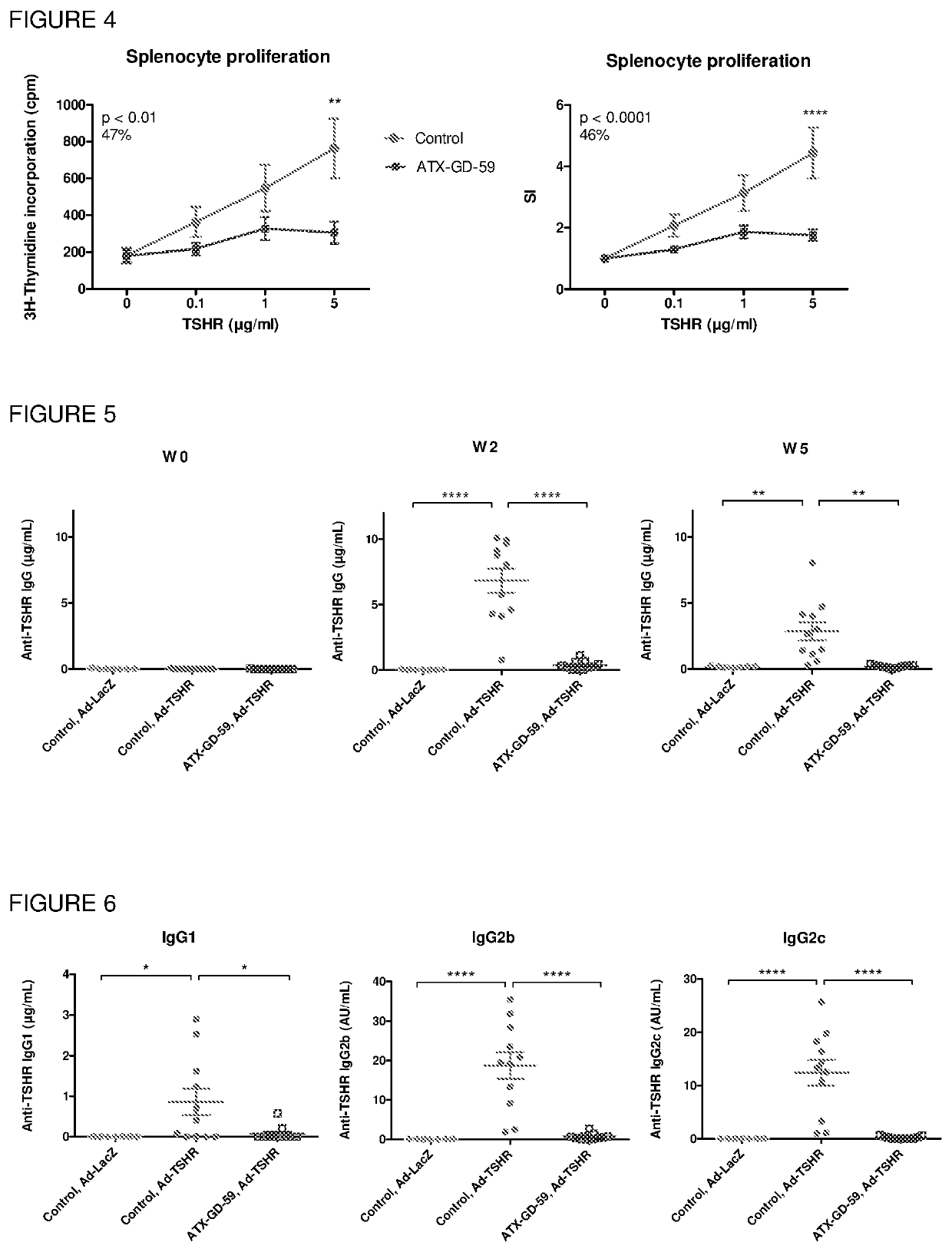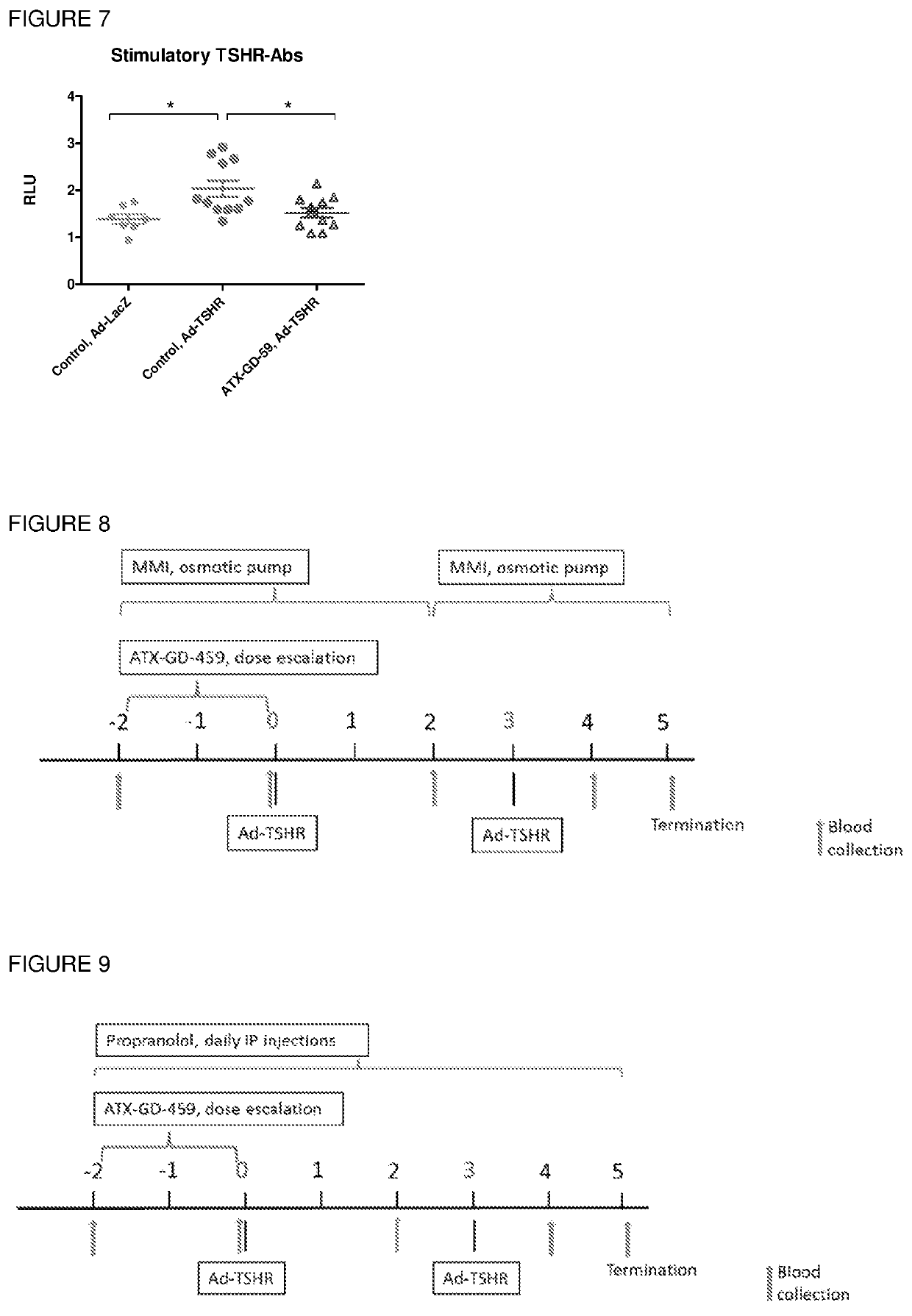Thyroid stimulating hormone receptor peptides and uses thereof
a thyroid gland and receptor technology, applied in the field of thyroid stimulating hormone receptor peptides, can solve the problems of enlargement of the thyroid gland (goitre), production of an excessive amount of thyroid hormone, severe dryness of the cornea, and visual field defects, and achieve the effect of suppressing or preventing the production of tshr autoantibodies
- Summary
- Abstract
- Description
- Claims
- Application Information
AI Technical Summary
Benefits of technology
Problems solved by technology
Method used
Image
Examples
example 1
Induces TSHR-Specific T Cell Tolerance and Reduces Anti-TSHR Antibody Titers in Animal Models in HLA-DR3 Transgenic Mice Material, Methods and Procedures
[0227]Mice
[0228]DR3tg mice were bred under specific pathogen-free conditions externally at Charles River, UK or InnoSer, NL. The DR3tg strain was originally created by Strauβ et al. In brief, genomic constructs used were a 6 kb Nde I fragment of a HLA-DRA genomic clone in pUC 13 and a 24 kb CLa I×Sal I fragment of cos 4.1, a cosmid (pTCF) containing the B gene of DRB1*0301. A solution containing 1-2 μg / mL of each construct was used for co-injection into fertilized eggs from (C57Bl / 6×DBA / 2)F1 donors mated with C57Bl / 6 males. The offspring were bred onto the IA-beta knockout C57BL / 6 genetic background (AB0 mice) lacking mouse MHC class II molecule expression. These DR3tg mice express the human MHC class II, HLA-DR3 molecule but not the mouse MHC class II molecule. Transgenic mice were identified by Southern blot analysis of tail DNA d...
example 2
tion of ATX-GD-459 and Clinically Used Drugs for Graves' Disease
[0258]Materials and Methods
[0259]Mice
[0260]DR3tg mice were bred under specific pathogen-free conditions externally at Charles River, UK. The DR3tg strain was originally created by Strauss et al (Strauss et al, 1994, Immunogenetics 3, 104-108). In brief, the genomic constructs used were a 6 kb NdeI fragment of a HLA-DRA genomic clone in pUC 13 and a 24 kb ClaI×SalI fragment of cos 4.1, a cosmid (pTCF) containing the B gene of DRB1*0301. A solution containing 1-2 μg / mL of each construct was used for co-injection into fertilised eggs from (C57BL / 6×DBA / 2) F1 donors mated with C57BL / 6 males. The offspring has later been bred into the IA-beta knockout C57BL / 6 genetic background (AB0 mice) lacking mouse MHC class II molecule expression. These DR3tg mice express the HLA-DRB1*0301 molecule but not the mouse MHC-II molecule. The mice were maintained by backcrossing to C57BL / 6 and to B10.Q. Transgenic mice were identified by South...
example 3
Cell Tolerisation with ATX-GD-459
[0294]Hybridoma clones specific for RNB-4K and RNB-5D were chosen to determine whether the RNB-4K-GKK and RNB-5D-K1 peptides were apitopes. ‘Antigen processing independent presentation’ (APIPS) assays were performed and RNB-4K-GKK and RNB-5D-K1 peptides were confirmed to be apitopes (FIG. 27).
[0295]The ability of a composition comprising the peptides shown in Table 1 (termed ATX-GD-459), or the individual peptides administered alone, to induce tolerance towards TSHR was determined. The ex vivo tolerisation protocol is shown in FIG. 19.
[0296]
TABLE 1PeptideSequenceSEQ ID NO:RNB-5D-K1KKKKYVSIDVTLQQLESHKKKSEQ ID NO: 1RNB-4K-GKKKKGNLPNISRIYVSIDVTGKKSEQ ID NO: 4RNB-9BGLKMFPDLTKVYSTDSEQ ID NO: 2
[0297]HLA-DR3 mice were treated with ATX-GD-459 according to the dose escalation schedule and immunised with parental peptides 4K / 5D / 9B together in CFA. The results showed that ATX-GD-459 treatment induced significant levels of TSHR-specific tolerance in both spleen ...
PUM
| Property | Measurement | Unit |
|---|---|---|
| concentration | aaaaa | aaaaa |
| concentration | aaaaa | aaaaa |
| concentrations | aaaaa | aaaaa |
Abstract
Description
Claims
Application Information
 Login to View More
Login to View More - R&D
- Intellectual Property
- Life Sciences
- Materials
- Tech Scout
- Unparalleled Data Quality
- Higher Quality Content
- 60% Fewer Hallucinations
Browse by: Latest US Patents, China's latest patents, Technical Efficacy Thesaurus, Application Domain, Technology Topic, Popular Technical Reports.
© 2025 PatSnap. All rights reserved.Legal|Privacy policy|Modern Slavery Act Transparency Statement|Sitemap|About US| Contact US: help@patsnap.com



